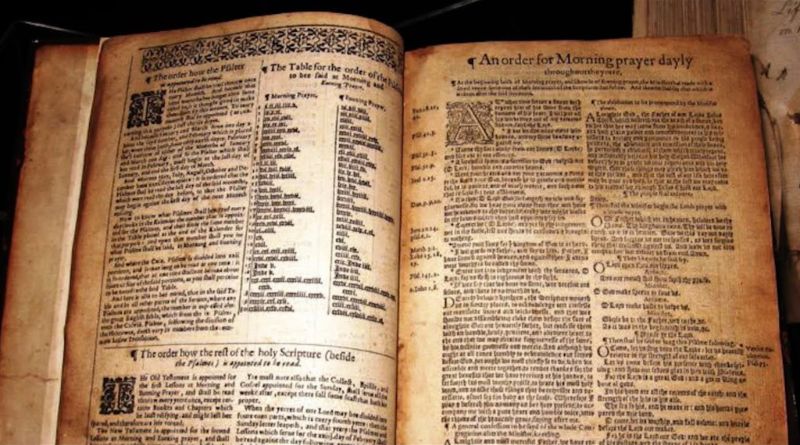The Geneva Bible, first published in 1560, was a landmark in the history of Bible translations. It was one of the first translations into English that included chapter and verse divisions, extensive marginal notes, and a focus on making the scriptures accessible to the common people. However, despite its widespread popularity, the Geneva Bible faced opposition and was eventually banned by English authorities. To understand why, we must look at the historical context, religious tensions, and political motivations surrounding its publication and use.
Table of Contents
The Context of the Geneva Bible’s Creation
The Geneva Bible was created by a group of English Protestant exiles who had fled to Geneva, Switzerland, during the reign of the Catholic Queen Mary I of England. These exiles sought refuge from the religious persecution they faced in England under her rule. The English Reformers in Geneva were inspired by the teachings of the Protestant Reformation, which emphasized the authority of scripture and the individual’s ability to read and interpret the Bible for themselves, without the need for clerical intermediaries.
The Geneva Bible was groundbreaking in many ways:
- Translation: It was translated directly from Hebrew and Greek texts, making it one of the most accurate translations of its time.
- Marginal Notes: The Bible included extensive marginal notes and commentary that provided explanations and interpretations of passages, often supporting Protestant doctrines, such as the rejection of the papacy and the idea of predestination.
- Accessibility: It was affordable and intended for everyday readers, making it more accessible to a broad audience, rather than just the clergy or the educated elite.
Despite its merits, the Geneva Bible would eventually face resistance from English authorities, leading to its banning.
Reasons for the Banning of the Geneva Bible
1. Religious and Political Tensions
The primary reason for the ban on the Geneva Bible was its perceived threat to the authority of the monarchy and the established church. Queen Elizabeth I, who ascended to the throne in 1558, was keen on maintaining religious stability and consolidating the Church of England as the central institution in English life. The Geneva Bible was considered dangerous by many within the Anglican Church and the monarchy for several reasons.
- Anti-Royal Marginal Notes: One of the most controversial aspects of the Geneva Bible was the marginal notes, which were often critical of the monarchy and the role of kings. For example, it included commentary that supported the idea that a ruler who acted unjustly could be overthrown, a notion that was seen as subversive and contrary to the divine right of kings. The English monarchy, which held absolute power, saw this as a direct challenge to royal authority and a potential source of rebellion.
- Predestination and Religious Doctrine: The Geneva Bible also contained doctrinal notes supporting the ideas of predestination and the rejection of certain Catholic practices. This was seen as a challenge to the established Anglican Church, which was attempting to find a middle ground between Roman Catholicism and Protestantism. The Geneva Bible’s emphasis on Protestant doctrines aligned it more closely with Puritan ideals, which sought to purify the Church of England from any remaining Catholic influence.
2. The Rise of the King James Bible
In 1604, King James I of England, who had succeeded Elizabeth I, authorized the translation of a new Bible, known as the King James Version (KJV). King James had political and religious reasons for promoting a new translation. The Geneva Bible’s popularity and its association with the Puritan movement posed a threat to the stability of the monarchy, as Puritans were often seen as radical reformers who pushed for further separation from Catholic traditions.
The King James Version was intended to unite English Christians under one translation that would be free of controversial annotations and theological disputes. The KJV was designed to support the authority of the crown and the established church, and its lack of marginal notes was a significant factor in its acceptance.
3. Perceived Threat to Church Authority
The Geneva Bible’s emphasis on the individual’s right to interpret the Bible, as well as its anti-Catholic and anti-royal commentary, was seen as a threat to both the Catholic Church and the Anglican establishment. The marginal notes encouraged personal interpretation of scripture, which was seen as undermining the authority of the clergy. At a time when religious unity was crucial to maintaining political stability, the English authorities were eager to suppress any form of dissent that could challenge the established religious order.
4. The Role of the Puritans
The Puritans, a group of Protestants who sought to purify the Church of England, were strong supporters of the Geneva Bible. They believed that it was a more faithful translation and reflected their theological views more accurately than the official King James Bible. However, the Puritan movement was seen as politically and religiously radical by the monarchy and the Anglican Church. As the Geneva Bible became associated with Puritanism, its popularity waned among those who sought to prevent the rise of Puritan influence.
The Decline of the Geneva Bible
By the early 17th century, the King James Bible had become the dominant English translation. It was promoted by the monarchy and became the standard for public worship, education, and government use. With the rise of the King James Bible, the Geneva Bible gradually fell out of favor, and its use was effectively supplanted. The marginal notes, which had been one of the key features of the Geneva Bible, were replaced by a more neutral approach in the King James Version, which was seen as less politically and religiously divisive.
While the Geneva Bible was banned and largely replaced, it left an indelible mark on the history of English Bible translation and on the Protestant Reformation. It was the Bible used by many early English-speaking Protestants, including the Pilgrims and Puritans who settled in America. The Geneva Bible’s emphasis on personal engagement with the scriptures and its influence on the development of later English translations remain part of its legacy.
Frequently Asked Questions (FAQs)
1. Why was the Geneva Bible more popular than the King James Bible initially?
- The Geneva Bible was more popular initially because it was the first Bible translated directly from Hebrew and Greek texts into English, and it was printed in a portable, affordable format. Its extensive marginal notes made it easier for laypeople to understand and engage with the scriptures, while the King James Bible initially lacked these annotations.
2. What were the main differences between the Geneva Bible and the King James Bible?
- The most significant differences were the marginal notes. The Geneva Bible included commentary that reflected Protestant, particularly Puritan, views, including the idea of predestination and criticism of the monarchy. The King James Bible, on the other hand, had no marginal notes and was more neutral in its interpretation, which made it more acceptable to the monarchy and the Anglican Church.
3. Did the Geneva Bible ever regain popularity?
- While the Geneva Bible remained influential among English-speaking Protestants for a time, its use declined after the publication of the King James Bible. The King James Version became the preferred translation for both religious and political reasons, and the Geneva Bible was largely forgotten until modern scholars revived interest in it.
4. Why were the marginal notes in the Geneva Bible so controversial?
- The marginal notes in the Geneva Bible were controversial because they often challenged the authority of the monarchy and the Anglican Church. They supported Protestant doctrines, particularly those of the Puritans, who were seen as radical reformers, and they questioned the legitimacy of royal authority, advocating for the idea that rulers could be overthrown if they were unjust.
5. Did the banning of the Geneva Bible affect its influence?
- While the Geneva Bible was banned and replaced by the King James Bible in England, its influence persisted, especially among the Puritans and other Protestants who valued its theological content. It also played a significant role in shaping the religious and political landscape of early America, where it was used by the Pilgrims and other settlers.
Conclusion
The banning of the Geneva Bible in England was the result of religious, political, and doctrinal conflicts during a time of intense religious upheaval. The Geneva Bible’s marginal notes, which questioned the authority of the monarchy and the church, were seen as subversive, making the translation a target for suppression. Although it was eventually replaced by the King James Bible, the Geneva Bible remains an important chapter in the history of English Bible translations and the Protestant Reformation.



